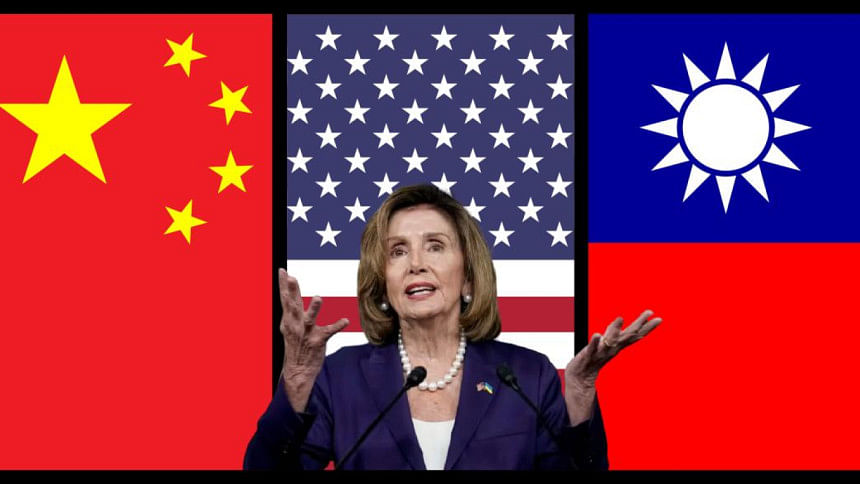The Pelosi Trip: How US, China and Taiwan see it

US House Speaker Nancy Pelosi's visit to Taiwan has triggered a fierce rhetorical response between the United States and China – sparking fears that Beijing will engineer an unprecedented escalation.
Here's how each side views the development
USA
USA thinks Pelosi's visit to Taiwan in no way contradicts the long-standing "One China" policy while China finds the visit as a provocation and violation of the policy – amid rising tensions between China and the US as bilateral ties have deteriorated in recent years.
In an opinion piece published in the Washington Post on August 2, 2022, Nancy Pelosi wrote that the United States Congress overwhelmingly passed the Taiwan Relations Act, one of the most important pillars of US foreign policy in the Asia Pacific, some 43 years ago.
"Our visit – one of several congressional delegations to the island – in no way contradicts the long-standing one-China policy, guided by the Taiwan Relations Act of 1979, the US-China Joint Communiques and the Six Assurances."
President Jimmy Carter signed into law, which set out America's commitment to a democratic Taiwan, providing the framework for an economic and diplomatic relationship to quickly flourish a key partnership. It nurtured a deep-rooted friendship with shared interests and values: self-determination, democracy and freedom, human dignity and rights.
"To consider any effort to determine the future of Taiwan by other than peaceful means … a threat to the peace and security of the Western Pacific area and of grave concern to the United States," Pelosi wrote.
"Today, America must remember that vow," she added, saying that in recent years, Beijing has dramatically intensified tensions with Taiwan.
"The People's Republic of China (PRC) has ramped up patrols of bombers, fighter jets and surveillance aircraft near and even over Taiwan's air defense zone, leading the U.S. Defense Department to conclude that China's army is 'likely preparing for a contingency to unify Taiwan with the PRC by force'," she observed.
Beijing is squeezing Taiwan economically, pressuring global corporations to cut ties with the island, intimidating countries that cooperate with Taiwan, and clamping down on tourism from the PRC, she claimed in her opinion piece.
"Our visit – one of several congressional delegations to the island – in no way contradicts the long-standing one-China policy, guided by the Taiwan Relations Act of 1979, the US-China Joint Communiques and the Six Assurances."
CHINA
Meanwhile, Beijing today (August 3, 2022) voiced strong condemnation over Pelosi's visit and said it's a provocative move.
China termed the visit "a gross violation of the country's sovereignty and territorial integrity".
"Those who play with fire will perish by it," China Daily quoted Xi.
A statement of Chinese Foreign Ministry, issued shortly after Pelosi's arrival in Taipei, said that since she is a leader in the US Congress, her visit to and activities in Taiwan – in whatever form and for whatever reason – are a major political provocation in order to upgrade US official exchanges with Taiwan, according to a report published in China Daily today.
"This is a serious violation of the one-China principle and the provisions of the three China-US joint communiques. It has a severe impact on the political foundation of China-US relations, and seriously infringes upon China's sovereignty and territorial integrity. It gravely undermines peace and stability across the Taiwan Straits, and sends a seriously wrong signal to the separatist forces for 'Taiwan independence'."
China absolutely does not accept this, and the Chinese people absolutely reject this, the statement said.
China will take all necessary measures to resolutely safeguard its sovereignty and territorial integrity, the statement said, and Washington and "Taiwan independence" forces will be responsible for all of the consequences, it added.
During a phone conversation with US President Joe Biden last week, President Xi Jinping said that China firmly opposes separatist moves toward "Taiwan independence" and interference by external forces, and never allows any room for "Taiwan independence" forces in whatever form.
"Those who play with fire will perish by it," China Daily quoted Xi.
State Councillor and Chinese Foreign Minister Wang Yi also warned that some US politicians "play with fire" on the Taiwan question and there will never be a good ending for them. Washington is behaving like a bully, which makes the international community realise that the US is the biggest peace breaker in the world, he added.
Martin Jacques, a former senior fellow at the Department of Politics and International Studies at Cambridge University, said that a visit by Pelosi to Taiwan would raise the bar of provocation toward China. "It will serve only to raise tensions, increase suspicions and heighten the danger of a military conflict," Jacques wrote in an opinion piece published by Global Times.
As the relationship between China and the US becomes increasingly unpredictable, Taiwan has become by far the most dangerous source of tension and conflict, Jacques wrote, adding that the two countries need to reaffirm the basic principles of their long-held and shared understanding over Taiwan.
TAIWAN
According to a retired United States Air Force (USAF) officer, it would be foolish for China to start a war over Nancy Pelosi's visit to Taiwan, considering the heightened American military presence in the region.
"President Xi would make a foolish mistake to start a war now, especially when the US and allies are at a heightened state of alert. He might launch some missiles, launch a large number of military aircraft, and some other symbolic actions, but not a war. He would violate Mao's edict of using deception as much as possible. There would be no deception in this case except for all of the bluster," said Guermantes Lailari, retired Lieutenant Colonel of the USAF specialising in the Middle East, Europe, and Asia.
An analysis of Reuters said today, as China embarks on an unprecedented six days of military drills surrounding Taiwan, security analysts are warning of mounting risks of escalation.
"We can see China's ambition: to make the Taiwan Strait non-international waters, as well as making the entire area west of the first island chain in the western pacific its sphere of influence," said a senior Taiwanese official familiar with its security planning.
If China got what it wanted, the official said, the impact would "be fatal for the safety and stability of regional countries, as well as for the regional economy."

 For all latest news, follow The Daily Star's Google News channel.
For all latest news, follow The Daily Star's Google News channel. 








Comments